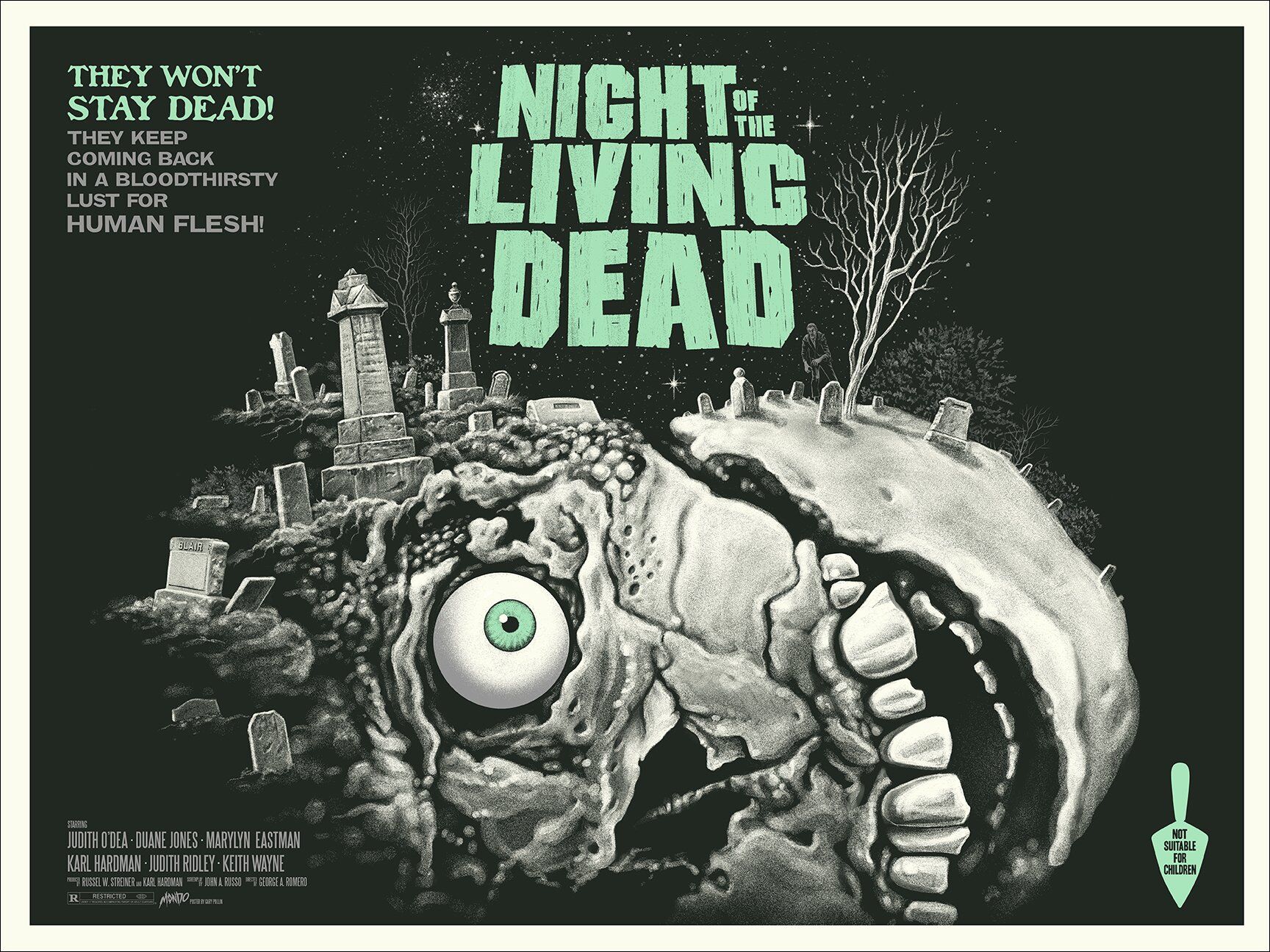It doesn’t take a horror buff to know the name George A. Romero, whose uniquely nasty brand of undead carnage has horrified theaters and households worldwide since the late 1960s. His Living Dead series is one of the chief contributors to the look, sound and overall behavior of zombies in modern culture, and Romero is often described as “iconic” within the horror genre and “Father of the Zombie Film” for his essential and influential work within the Zombie sub-genre.
Starting out in 1960, just after graduating from college, Romero began by shooting short films and television commercials before getting together with some friends in the later 60s and forming what they called Image Ten Productions, the company that would produce his first cult classic, Night of The Living Dead (1968). Since then Romero’s work has been revered and detested in just about equal measure, and here I will explore some of the more notable entries in his filmography and why they were so divisive from societal commentary to pushing the limits of horror.
George Romero passed away July of 2017. RIP to one of the greats; George Romero February 4, 1940 – July 16, 2017
When there’s no more room in hell, the dead will walk the earth.
George A. Romero
Night of The Living Dead (1968)
The original. The progenitor. The timeless classic which pioneered the entire zombie genre. Romero’s first major motion picture shocked audiences with its mix of graphic violence, creeping horror and sharp social commentary back in the late 60s, when all people had seen of zombies were the more focused and often voodoo-based flicks of the 30s and 40s, beginning with Victor Halperin’s 1932 opus, White Zombie. Night of The Living Dead tells the tale of a group of Pennsylvanians hiding out from the undead apocalypse in a farmhouse basement. Grim news reports detail the carnage in the surrounding areas as the group fend off the walking dead from their makeshift fortress. Being filmed in black and white certainly adds a lot to the grotesque atmosphere and hides a lot of the budgetary and technological constraints of the time, proving Romero’s first entry to be just as effectively gruesome today as it ever was.
Turns out there was a miss in the copyright of the original Night of The Living Dead so it can be readily streamed for free on many services as it is now in the Public Domain.
The Crazies (1973)
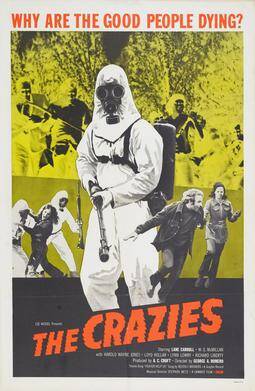
The few films Romero released just after the critical success that was ‘Living Dead were sadly not so well received, one of these being The Crazies. The Crazies centers around a small town affected by an airborne bioweapon which causes people to become homicidal psychopaths. We follow a nurse (Lane Carroll) and her husband (W.G. McMillan) as they try to flee their infected town. When the US army turns up to control the outbreak, the chaos ramps up even more in what is, if not Romero’s best work, still a potent low-budget shocker with plenty to satisfy even discerning horror fans. Like many of Romero’s classics,The Crazies was a big enough hit to warrant a remake in 2010, with a fresh and terrifying look at the source material that some deem to be better than the original.
The Amusement Park (1975)
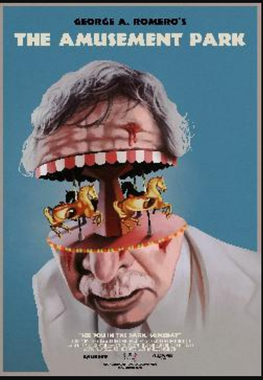
While not exactly horror, and not exactly a feature film, Romero’s The Amusement Park is as sharp on social commentary as it is chilling. Believed lost until 2017 when a print was found and given a 4k restoration by IndieCollect, the film was originally commissioned as an educational piece on elder abuse but mothballed after completion.
Lincoln Maazel plays Martin, an elderly man on a visit to, you guessed it, an amusement park. What follows is a ride as unsettling as it may be upsetting for some, and though the metaphors on the way elderly people are treated by society are heavy handed, Maazel’s disoriented performance amongst the screaming crowds and roaring rollercoasters is as frightening as ever. The Amusement Park is Romero at the height of his vicious cynicism, a deeply unnerving psychological head trip peppered with absurdist jabs at an uncaring society. If Romero was alive to see its eventual release I’m sure he’d have more than one interesting story to tell, though to have it released at all is a blessing for any horror fan.
Dawn of The Dead (1978)
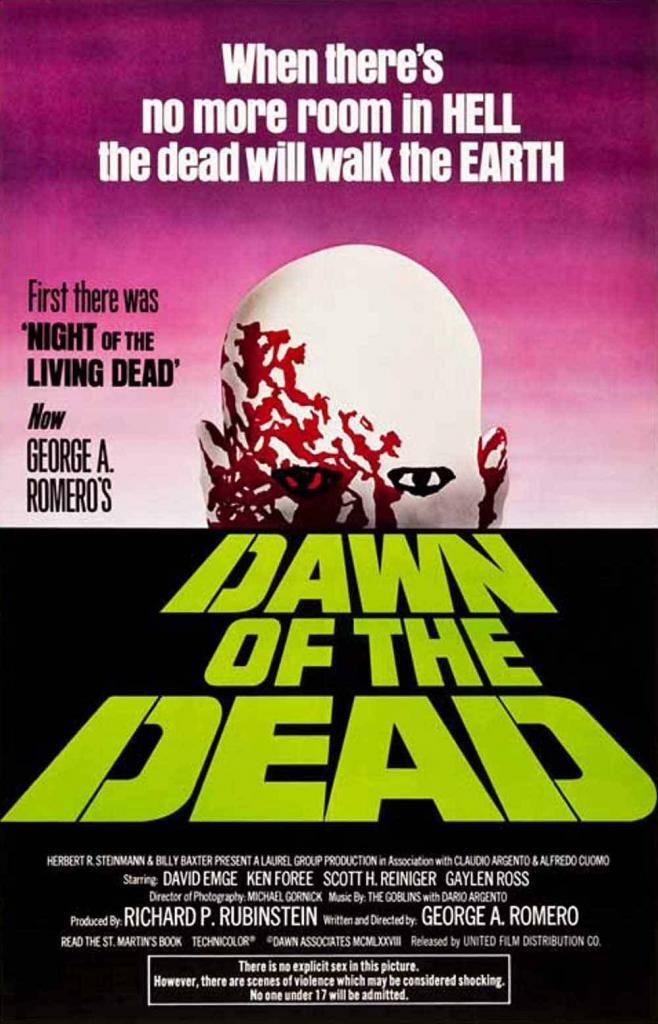
Ten years after his original zombie horror show Romero returned with Dawn of The Dead. While it features no characters or settings from its predecessor, this was the second film in Romero’s Living Dead series and focused on the wider effects the zombie outbreak has on society. Boasting a much larger scale and a clearly bigger budget, Dawn focuses on two Philadelphia S.W.A.T. team members, a traffic reporter, and his television executive girlfriend as they seek shelter from the rotting hordes in an abandoned shopping mall. It is often regarded as one of the best zombie movies ever made for its uncompromising and shocking gore, sharply misanthropic social commentary and no-holds-barred zombie action.
Shot at the Monroeville Mall and in Pittsburgh; the special make-up effects were created by Tom Savini, also a Pittsburgh native. To this date the mall still holds an annual Zombie Fest.
Creepshow (1982)
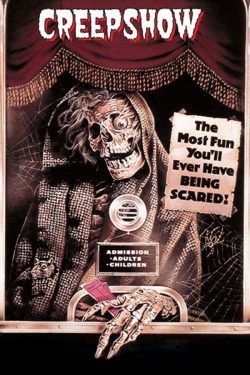
Creepshow saw Romero leaning more into his campy tendencies with a hilarious horror/comedy anthology film based on the E.C. horror comics of the 50s. Written by, and starring none other than Stephen King himself, Creepshow is a colorful, wacky homage to pulpy low-brow horror that pays true tribute to its inspirational works. An all-star cast including Tom Savini, Leslie Nielsen and Hal Holbrook play out five brief but volatile short horror films with such stories as a rural man dealing with an extraterrestrial visitor, a man using unorthodox means of revenging his cheating wife and a terrifying monster breaking free of its holding cell and causing a path of destruction.
Day of The Dead (1985)
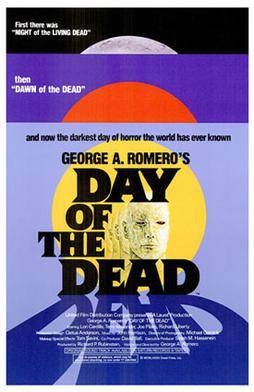
Romero’s Living Dead series is back with another scathingly cynical view on society decorated with buckets of blood and gore. Day of The Dead is the third in the series and, while not considered to be as incendiary in its message and haunting in its execution as previous entries, it still has a few gruesome tricks up its sleeve. Its story sees the zombies coming together and evolving as the survivors of the outbreak hunker down in an old missile silo underground. Focus is given more to the dangers of people rather than the undead this time around, with survivors devolving into cavemen below the surface while the zombie hordes begin to thrive in their new kingdom. Day of the Dead deals with the conflicting ethos of science vs military in a ravaged Earth, demonstrating as clearly as ever that humans don’t need to be nukes into oblivion when their own idiocy can get them into a similar state.
Land of The Dead (2005)
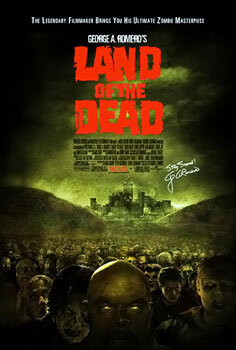
Fast forward 20 long years and Romero proved once again that his zombies simply don’t stay dead. Land of The Dead developed Romero’s concepts of human hierarchy further by splitting the surviving factions of humans into upper-class, who live out the apocalypse from the comfort of their high-rise tower block, and lower-class, who must sweat it out in the makeshift slums below. While some of the originality of the original trilogy is lost in the sometimes-on-the-nose social commentary this time around, there is plenty of flesh-eating fun to satiate the hungriest zombie fan. Paul Kaufman (Dennis Hopper) enforces brutal class distinctions between his feudal society while a secret rebellion is in the works to overthrow him. Couple these elements with a horde of evolving zombies that are learning to adapt, and the chaos of Land of the Dead is really something to behold.
Diary of The Dead (2007)
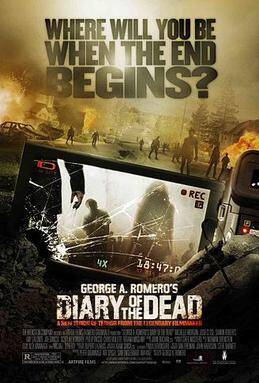
Now here is a curveball that none saw coming. With Romero’s fifth installment in his Living Dead series he decided to change format completely and shoot the whole affair in a found-footage/documentary style. While independently produced, the film did see a theatrical release by The Weinstein Company. This entry takes place at the beginning of the outbreak, telling the tale of a group of students and their professor attempting to make a horror film in the forest. Before long the living dead hone in on the class and begin to pick them off one by one. Romero’s political edge is as prevalent as ever, with a good amount of his jabs being taken at the media and their implication in disastrous events, in this case the zombie apocalypse. There’s not a whole lot more to say about Diary of the Dead as, as entertaining and effective as it can be, the whole field starts to feel a bit trodden by this point.
Survival of The Dead (2009)
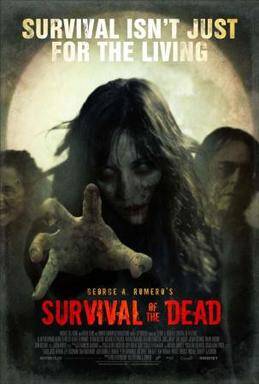
A zombie virus has plagued the Earth, and one group of soldiers traverses the more rural areas to scavenge for supplies after abandoning their post. The soldiers hear of a safe haven on Plum Island, however when they get there they find a fierce battle between warring families, The O’Flynns and The Muldoons. The O’Flynns want to exterminate all zombies for good while the Muldoons want to live peacefully among their living-dead friends and family. A plot like this leaves plenty of room for Romero’s signature scathing wit, though even the most die-hard fans will admit at this point that their hero is starting to run out of ideas. Sub-par directing, questionable acting and a script that doesn’t quite know what it wants to be makes Survival of the Dead barely a footnote in the legacy that once took theaters by storm.
George Romero’s Other Works
Aside from his extensive work with Zombies he also contributed to horror with the following films and TV show.
Martin (1978)
Knightriders (1981)
Monkey Shines (1988)
The Dark Half (1993)
Bruiser (2000)
created and executive-produced the television series Tales from the Darkside, from 1983 to 1988.
I didn’t play practical jokes at home. I had a strict upbringing, which is part of my rebellion. I was raised Catholic and went to parochial school, which is why priests and nuns appear in my movies a lot, and I don’t have very much nice to say about them.
George A Romero
If you are inspired by George A. Romero like we are you can now study horror at the George Romero foundation.
Joe first knew he wanted to write in year six after plaguing his teacher’s dreams with a harrowing story of World War prisoners and an insidious ‘book of the dead’. Clearly infatuated with horror, and wearing his influences on his sleeve, he dabbled in some smaller pieces before starting work on his condensed sci-fi epic, System Reset in 2013.Once this was published he began work on many smaller horror stories and poems in bid to harness and connect with his own fears and passions and build on his craft.
Joe is obsessed with atmosphere and aesthetic, big concepts and even bigger senses of scale, feeding on cosmic horror of the deep sea and vastness of space and the emotions these can invoke. His main fixes within the dark arts include horror films, extreme metal music and the bleakest of poetry and science fiction literature.
He holds a deep respect for plot, creative flow and the context of art, and hopes to forge deeper connections between them around filmmakers dabbling in the dark and macabre.

